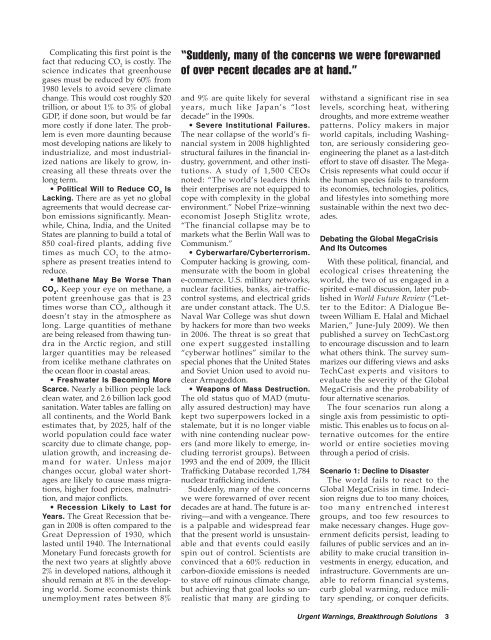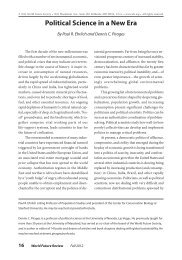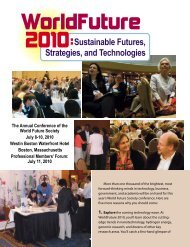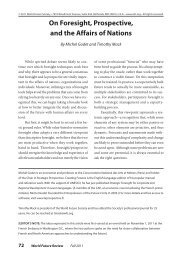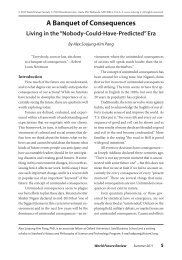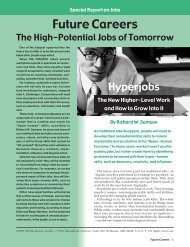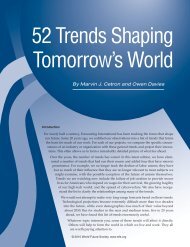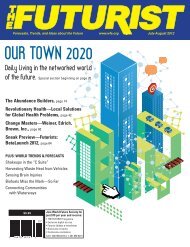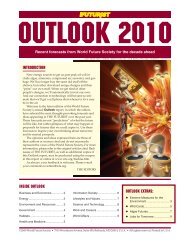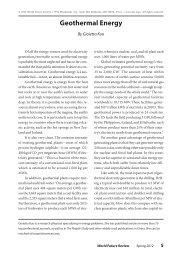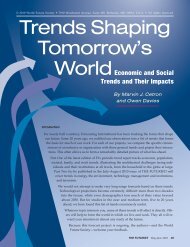Urgent Warnings, Breakthrough Solutions, Second Edition
Urgent Warnings, Breakthrough Solutions, Second Edition
Urgent Warnings, Breakthrough Solutions, Second Edition
Create successful ePaper yourself
Turn your PDF publications into a flip-book with our unique Google optimized e-Paper software.
Complicating this first point is the<br />
fact that reducing CO 2<br />
is costly. The<br />
science indicates that greenhouse<br />
gases must be reduced by 60% from<br />
1980 levels to avoid severe climate<br />
change. This would cost roughly $20<br />
trillion, or about 1% to 3% of global<br />
GDP, if done soon, but would be far<br />
more costly if done later. The problem<br />
is even more daunting because<br />
most developing nations are likely to<br />
industrialize, and most industrialized<br />
nations are likely to grow, increasing<br />
all these threats over the<br />
long term.<br />
• Political Will to Reduce CO 2<br />
Is<br />
Lacking. There are as yet no global<br />
agreements that would decrease carbon<br />
emissions significantly. Meanwhile,<br />
China, India, and the United<br />
States are planning to build a total of<br />
850 coal-fired plants, adding five<br />
times as much CO 2<br />
to the atmosphere<br />
as present treaties intend to<br />
reduce.<br />
• Methane May Be Worse Than<br />
CO 2<br />
. Keep your eye on methane, a<br />
potent greenhouse gas that is 23<br />
times worse than CO 2<br />
, although it<br />
doesn’t stay in the atmosphere as<br />
long. Large quantities of methane<br />
are being released from thawing tundra<br />
in the Arctic region, and still<br />
larger quantities may be released<br />
from icelike methane clathrates on<br />
the ocean floor in coastal areas.<br />
• Freshwater Is Becoming More<br />
Scarce. Nearly a billion people lack<br />
clean water, and 2.6 billion lack good<br />
sanitation. Water tables are falling on<br />
all continents, and the World Bank<br />
estimates that, by 2025, half of the<br />
world population could face water<br />
scarcity due to climate change, population<br />
growth, and increasing demand<br />
for water. Unless major<br />
changes occur, global water shortages<br />
are likely to cause mass migrations,<br />
higher food prices, malnutrition,<br />
and major conflicts.<br />
• Recession Likely to Last for<br />
Years. The Great Recession that began<br />
in 2008 is often compared to the<br />
Great Depression of 1930, which<br />
lasted until 1940. The International<br />
Monetary Fund forecasts growth for<br />
the next two years at slightly above<br />
2% in developed nations, although it<br />
should remain at 8% in the developing<br />
world. Some economists think<br />
unemployment rates between 8%<br />
“Suddenly, many of the concerns we were forewarned<br />
of over recent decades are at hand.”<br />
and 9% are quite likely for several<br />
years, much like Japan’s “lost<br />
decade” in the 1990s.<br />
• Severe Institutional Failures.<br />
The near collapse of the world’s financial<br />
system in 2008 highlighted<br />
structural failures in the financial industry,<br />
government, and other institutions.<br />
A study of 1,500 CEOs<br />
noted: “The world’s leaders think<br />
their enterprises are not equipped to<br />
cope with complexity in the global<br />
environment.” Nobel Prize–winning<br />
economist Joseph Stiglitz wrote,<br />
“The financial collapse may be to<br />
markets what the Berlin Wall was to<br />
Communism.”<br />
• Cyberwarfare/Cyberterrorism.<br />
Computer hacking is growing, commensurate<br />
with the boom in global<br />
e-commerce. U.S. military networks,<br />
nuclear facilities, banks, air-trafficcontrol<br />
systems, and electrical grids<br />
are under constant attack. The U.S.<br />
Naval War College was shut down<br />
by hackers for more than two weeks<br />
in 2006. The threat is so great that<br />
one expert suggested installing<br />
“cyberwar hotlines” similar to the<br />
special phones that the United States<br />
and Soviet Union used to avoid nuclear<br />
Armageddon.<br />
• Weapons of Mass Destruction.<br />
The old status quo of MAD (mutually<br />
assured destruction) may have<br />
kept two superpowers locked in a<br />
stalemate, but it is no longer viable<br />
with nine contending nuclear powers<br />
(and more likely to emerge, including<br />
terrorist groups). Between<br />
1993 and the end of 2009, the Illicit<br />
Trafficking Database recorded 1,784<br />
nuclear trafficking incidents.<br />
Suddenly, many of the concerns<br />
we were forewarned of over recent<br />
decades are at hand. The future is arriving—and<br />
with a vengeance. There<br />
is a palpable and widespread fear<br />
that the present world is unsustainable<br />
and that events could easily<br />
spin out of control. Scientists are<br />
convinced that a 60% reduction in<br />
carbon-dioxide emissions is needed<br />
to stave off ruinous climate change,<br />
but achieving that goal looks so unrealistic<br />
that many are girding to<br />
withstand a significant rise in sea<br />
levels, scorching heat, withering<br />
droughts, and more extreme weather<br />
patterns. Policy makers in major<br />
world capitals, including Washington,<br />
are seriously considering geoengineering<br />
the planet as a last-ditch<br />
effort to stave off disaster. The Mega-<br />
Crisis represents what could occur if<br />
the human species fails to transform<br />
its economies, technologies, politics,<br />
and lifestyles into something more<br />
sustainable within the next two decades.<br />
Debating the Global MegaCrisis<br />
And Its Outcomes<br />
With these political, financial, and<br />
ecological crises threatening the<br />
world, the two of us engaged in a<br />
spirited e-mail discussion, later published<br />
in World Future Review (“Letter<br />
to the Editor: A Dialogue Between<br />
William E. Halal and Michael<br />
Marien,” June-July 2009). We then<br />
published a survey on TechCast.org<br />
to encourage discussion and to learn<br />
what others think. The survey summarizes<br />
our differing views and asks<br />
TechCast experts and visitors to<br />
evaluate the severity of the Global<br />
MegaCrisis and the probability of<br />
four alternative scenarios.<br />
The four scenarios run along a<br />
single axis from pessimistic to optimistic.<br />
This enables us to focus on alternative<br />
outcomes for the entire<br />
world or entire societies moving<br />
through a period of crisis.<br />
Scenario 1: Decline to Disaster<br />
The world fails to react to the<br />
Global MegaCrisis in time. Indecision<br />
reigns due to too many choices,<br />
too many entrenched interest<br />
groups, and too few resources to<br />
make necessary changes. Huge government<br />
deficits persist, leading to<br />
failures of public services and an inability<br />
to make crucial transition investments<br />
in energy, education, and<br />
infrastructure. Governments are unable<br />
to reform financial systems,<br />
curb global warming, reduce military<br />
spending, or conquer deficits.<br />
<strong>Urgent</strong> <strong>Warnings</strong>, <strong>Breakthrough</strong> <strong>Solutions</strong> 3


